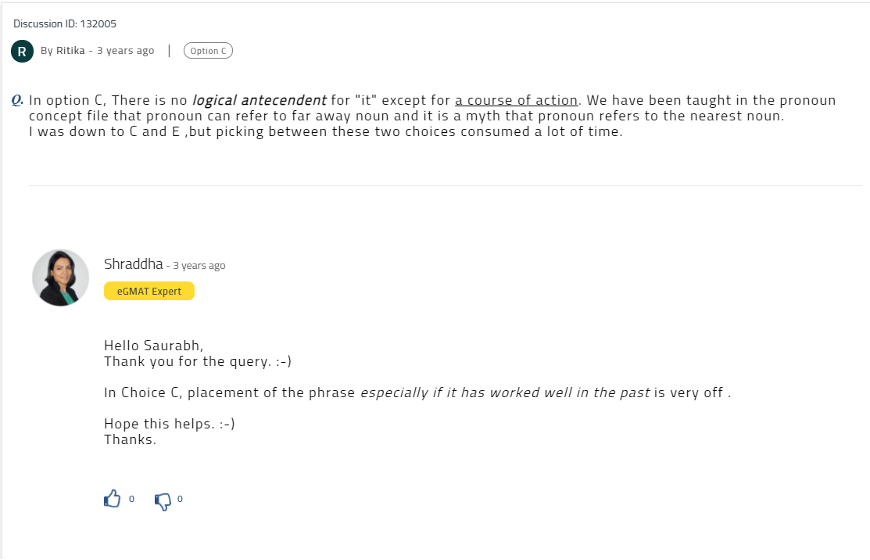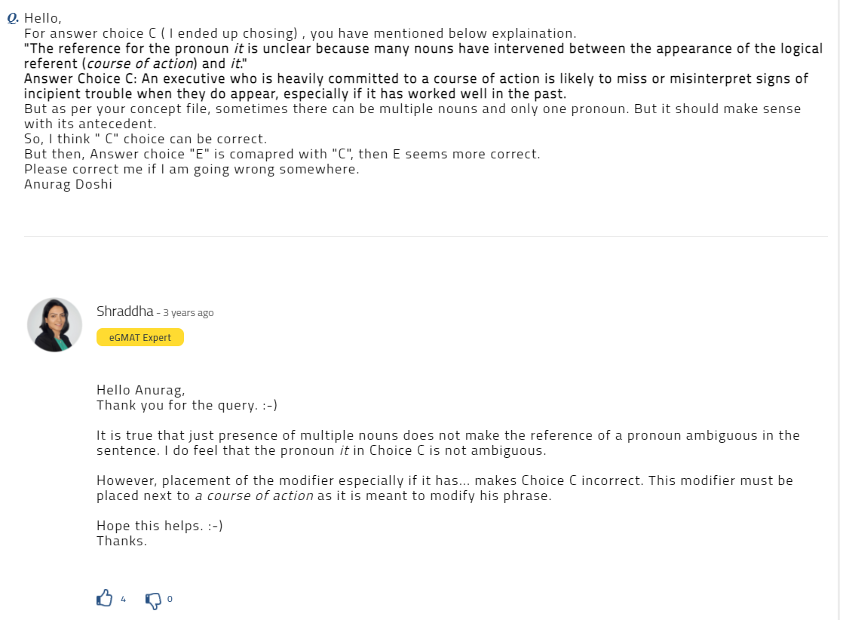In this article, we’ll look at the solution to this GMAT sentence correction question. We have analyzed the 5 answer choices and arrived at the correct choice through 3 steps:
- Meaning analysis
- Error analysis
- Answer choice analysis
General information on this question
- Difficulty level – High
- 54% of people got this question correct
- The average time taken to correctly answer this question – 1:52
Let’s look at the question and answer choices
Heavy commitment by an executive to a course of action, especially if it has worked well in the past, makes it likely to miss signs of incipient trouble or misinterpret them when they do appear
A. Heavy commitment by an executive to a course of action, especially if it has worked well in the past, makes it likely to miss signs of incipient trouble or misinterpret them when they do appear.
B. An executive who is heavily committed to a course of action, especially one that worked well in the past, makes missing signs of incipient trouble or misinterpreting ones likely when they do appear.
C. An executive who is heavily committed to a course of action is likely to miss or misinterpret signs of incipient trouble when they do appear, especially if it has worked well in the past.
D. Executives’ being heavily committed to a course of action, especially if it has worked well in the past, makes them likely to miss signs of incipient trouble or misinterpreting them when they do appear.
E. Being heavily committed to a course of action, especially one that has worked well in the past, is likely to make an executive miss signs of incipient trouble or misinterpret them when they do appear.

- OG – PQID : SC04408
Solution
Meaning Analysis
- Heavy commitment by an executive to a course of action,
- especially if it has worked well in the past,
- makes it likely to miss signs of incipient trouble or misinterpret them
- when they do appear.
- Heavy commitment by an executive to a course of action,
- especially if it has worked well in the past,
This sentence talks about blind commitment of an executive towards a method or course of action that has been successful in the past.
- (Cl. 1 Contd.)makes it likely to miss signs of incipient trouble or misinterpret them
- when they do appear.
Continuing about the blind commitment, the author says that this type of commitment is likely to result in missing or misreading the signs of emerging problem, when these signs begin to surface.
This sentence illogically says that heavy commitment misses or misreads the signs of ensuing problem.
From the context of the sentence, we can infer that because the executive relies on a particular method of operation, the executive fails to see or understand the signs of ensuing problems at the time when these signs begin to show up.
To sum it all, the authors intends to say that blind commitment to a particular method of operation makes an executive miss or misread the signs of ensuing problem when they begin to surface.
Error Analysis
Subject Verb Error
This sentence illogically says that heavy commitment makes it likely to miss signs or misreads the signs of the ensuing problem. However, we know from our meaning analysis that this meaning is illogical. The executive being heavily committed makes it likely that he or she will miss signs of trouble. Therefore, the subject “heavy commitment” does not make sense with the verb “makes,” and we have a subject-verb must make sense error.
Pronoun Error leading to Meaning Error
The antecedent for both the instances of it is not clear. It, in both the instances, may refer to either heavy commitment or a course of action.
While the first instance stands ambiguous, the second stands illogical because per the meaning analysis, the executive misses or misreads the signs of emerging issue as we inferred during the meaning analysis.
We understand from the context of the sentence that the executive misses the signs of troubles. But this information is not presented clearly in the original sentence.
P.S.: Usage of the present perfect tense verb has worked is correct along with in the past because the author does not intend to say that the course of action worked well in the past, and they do not work anymore. The success of the course of action is not a one-time event. The author intends to say that the course of action has worked well so far.
Answer Choice Analysis
Choice (A): Heavy commitment by an executive to a course of action, especially if it has worked well in the past, makes it likely to miss signs of incipient trouble or misinterpret them when they do appear.
Choice A: Incorrect (11% people chose this option)
This choice has pronoun error leading to meaning error as pointed out in error analysis.
Choice (B): An executive who is heavily committed to a course of action, especially one that worked well in the past, makes missing signs of incipient trouble or misinterpreting ones likely when they do appear.
Choice B: Incorrect
1. Subject-Verb Make Sense Error
Per this choice, the executive makes missing signs… likely. This is certainly not the intended meaning of the sentence.
2. Meaning Error
Per the intended meaning, because of the heavy commitment to a particular course of action, the executive misses the signs of emerging trouble. However, this blind commitment of an executive has been mentioned as additional information in this choice. It does not form the core meaning of the sense and hence leads to the meaning error.
3. Verb Tense Error
As mentioned in the Error Analysis, the success of the course of action is not a one-time event. Hence, use of simple past tense verb worked is incorrect.
4. Pronoun Error
The sentence talks about signs of trouble in general. Usage of them to refer to signs is better than the usage of ones.
Choice (C): An executive who is heavily committed to a course of action is likely to miss or misinterpret signs of incipient trouble when they do appear, especially if it has worked well in the past.
Choice C: Incorrect (22% people chose this option)
1. Meaning Error
This choice repeats the meaning error we spotted in Choice B.
2. Modifier Error
The modifier especially if it has worked well in the past is intended to modify a course of action. This is a noun modifier and hence should be placed closer to that noun entity.
Choice (D): Executives’ being heavily committed to a course of action, especially if it has worked well in the past, makes them likely to miss signs of incipient trouble or misinterpreting them when they do appear.
Choice D: Incorrect
1. Parallelism Error
In this sentence, or is the parallel marker. So, we have a list here. The first entity of this list is to miss, which is not parallel to the second entity misinterpreting.
2. Idiom Error
The phrase Executives’ being heavily committed is unnecessarily wordy in comparison to other options.
3. Pronoun Error
Non-possessive pronoun them should logically refer to plural Executives’, but it cannot do so because Executives’ is a possessive noun.
Choice (E): Being heavily committed to a course of action, especially one that has worked well in the past, is likely to make an executive miss signs of incipient trouble or misinterpret them when they do appear.
Choice E: Correct.
This choice correctly uses Being as a noun that has the correct verb is. All the modifiers are placed and worded correctly to convey the intended meaning of the sentence.
Most asked queries on this question
Question 1 – In option C, There is no logical antecedent for “it” except for a course of action. We have been taught in the pronoun concept file that pronoun can refer to far away noun and it is a myth that pronoun refers to the nearest noun. I was down to C and E, but picking between these two choices consumed a lot of time.
Answer – In Choice C, placement of the phrase especially if it has worked well in the past is very off.

Question 2 – I chose answer C, but as per your concept file, sometimes there can be multiple nouns and only one pronoun. But it should make sense with its antecedent. So, I think choice C can be correct.
But then, Answer choice “E” is compared with “C”, then E seems more correct.
It is true that just the presence of multiple nouns does not make the reference of a pronoun ambiguous in the sentence. I do feel that the pronoun it in Choice C is not ambiguous. However, placement of the modifier especially if it has… makes Choice C incorrect. This modifier must be placed next to a course of action as it is meant to modify his phrase.

FAQs
You can find some of the most challenging GMAT sentence correction questions and their solutions in this article.
You can find more than 400 free practice questions here.
It depends on your baseline score and your target score. To get a better answer take a look at this article














